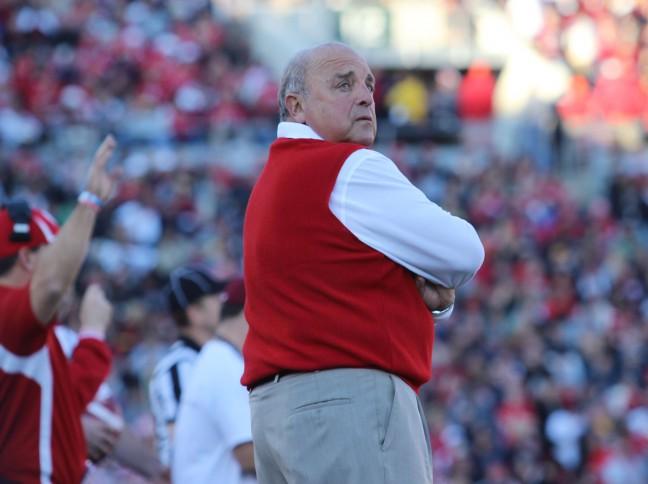The University of Wisconsin Athletics Department will likely face an issue in the coming years that is becoming more common nationwide: The controversy over whether or not college athletes should get paid.
California and New York are the first of potentially several states looking into the payment of college athletes for their name, image and likeness. The issue — which has been a major controversy for more than a decade — has taken rise with the revenue of the National Collegiate Athletic Association reaching into the billions.
California’s bill — titled the Fair Pay to Play Act — won’t allow schools to pay college athletes, but rather allows student-athletes to hire an agent who could then seek business deals for them. In addition to that rule, the law prevents California universities from revoking scholarships or eligibility for taking money from these business deals.
The California State Assembly passed the act by a vote of 72 to 0 in early September, the first major step toward student-athlete compensation. In the works since 2016, two California lawmakers wrote the bill with support from civil rights advocates and free-market proponents.
Gov. Gavin Newsom, D-Ca., signed the bill into law last Monday, Sept. 30. With that, the measure will go into effect Jan. 1, 2023 barring any major fight from the NCAA, which there is sure to be.
While the bill has received opposition from the NCAA, the University of California and California State University systems and high-profile private universities in California, it has also received support from several prominent figures, including NBA star Lebron James and Sen. Bernie Sanders, I-Vt.
Just days after the proposed bill from California made an appearance, a New York senator proposed a similar bill. This bill would not only allow athletes to seek deals for their name, image and likeness, but would also include the requirement of college athletic departments to give athlete’s a 15% share of their annual revenue.
The amendment requiring schools to pay student-athletes 15% of their annual revenue would be divided equally among all student-athletes who compete for the school.
Unlike California, New York hasn’t yet voted on the bill. New York’s legislature meets from January to June, so there won’t be any official votes until 2020.
While California and New York are the first two states to seriously discuss student-athlete compensation, Florida, Maryland, Colorado, South Carolina and Washington are among several others who have also discussed creating laws to pay student-athletes.
Gov. Newsom stated that he hopes that the passing of the law will encourage dozens of other states to introduce similar legislation and allow students to advocate for themselves and their finances.
Now, let’s take a look at how the University of Wisconsin looks at this issue.
The position that UW Chancellor Rebecca Blank takes is one that clearly aligns with what the NCAA and most universities believe: student-athletes should not be paid.
“It’s not clear that we would continue to run an athletic program,” Blank said, according to Law360.com. “We’re not interested in professional sports. We’re interested in student-athletes.”
While Chancellor Blank’s position on the matter is no surprise, it is surprising that, according to UW Athletic Director Barry Alvarez, no one at UW or within the Big Ten has held serious talks on the matter.
According to UW, non-resident scholarship athletes are paid $4,880 per year in full cost of attendance, while resident scholarship athletes are paid $4,270 per year. Alvarez also added that all athletes are offered free breakfast seven days a week at a training table.
“I find it upsetting that the athletes are saying that they’re starving,” Alvarez said. “I know what our athletes get.”
No Big Ten schools or states within the Big Ten have seriously discussed compensating athletes, but states like Minnesota and Pennsylvania are among those in preliminary talks.
Immediately following the announcement that California passed the Fair Pay to Play Act, Barry Alvarez released a statement in regards to his view on the implications for Wisconsin.
“I wouldn’t schedule anyone from California right now,” Alvarez said. “If they have different rules than we do, then all the sudden they aren’t amateurs.”
Just a day after Alvarez’s statement, coaches and players from across the Big Ten made comments about the California bill.
The responses were generally positive, with basketball players like Michigan State guard Cassius Winston and Minnesota guard Marcus Carr among those in support of the act.
Basketball coaches Fred Hoiberg of Nebraska and Richard Pitino of Minnesota also endorsed the implications of the bill.
On the other hand, Big Ten Commissioner Jim Delany announced his dismay with the Fair Pay to Play Act, citing that it breaks the educational bond that goes with college sports.
“To me, the outer limit is the cost of college. Once we’re beyond the cost of college, we’re in pay-for-play and it’s a totally different game,” Delany said.
While the broad issue of student-athlete compensation has come to the forefront in several areas of the U.S., there is no guess as to when that argument will reach Wisconsin. For now, Wisconsin athletes will continue to represent their university without compensation, with the exception of their monthly stipend.


